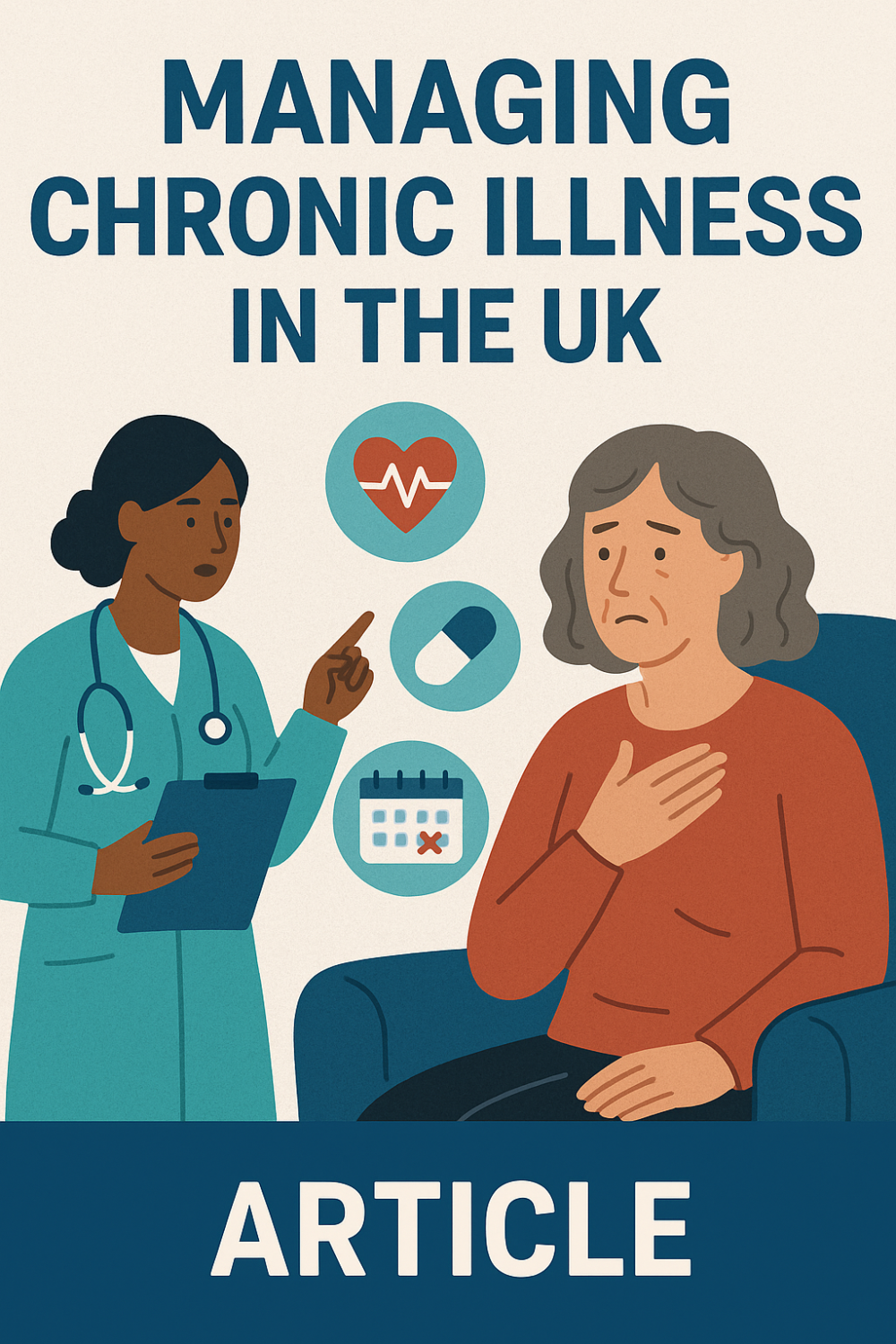Managing chronic illness instead of finding best health solution for patients
Hold on a minute! Ever feel like the healthcare system is a revolving door? You’re not alone. In fact, some argue that the financial incentives in many Western healthcare models, including our own NHS, inadvertently favour managing long-term conditions over outright cures. Let’s dive into this intriguing and sometimes frustrating reality, specifically looking at how it might affect those of us over 55.
NHS doesn’t healthcare?
Now, before anyone cries foul, it’s crucial to understand that the NHS is a system built on the admirable principle of universal healthcare. However, like any large organisation, it faces complex pressures and unintended consequences. Could some of these inadvertently lead to a focus on managing rather than resolving health issues for the over 55s? Let’s explore some potential areas.
Practical examples of how NHS is part of the problem not the solution!
Here are 9 practical examples of how the UK healthcare system could be perceived as being more focused on managing long-term conditions in the over 55s rather than offering definitive cures:
- Repeat Prescriptions: The streamlined system for repeat prescriptions, while convenient, generates ongoing revenue for pharmacies and necessitates regular GP appointments, even for stable conditions.
- Chronic Disease Management Programmes: While essential, these programmes often focus on monitoring and maintaining conditions like diabetes or hypertension rather than aggressively pursuing avenues for reversal or significant improvement.
- Specialist Referrals: Lengthy waiting lists for specialist appointments can delay access to potentially curative treatments, leading to the progression of conditions that might have been more effectively addressed earlier.
- Focus on Symptom Management: Sometimes, the emphasis can be on alleviating symptoms with medication rather than investigating and addressing the root cause of the illness, particularly in complex cases common in older adults.
- Funding Models: The way healthcare providers are funded might incentivise ongoing patient management rather than one-off curative procedures. This is a complex area with much debate, but it’s worth considering.
- Research Priorities: While significant research occurs, the focus may sometimes lean towards developing new management strategies for prevalent chronic diseases rather than seeking elusive cures.
- Interoperability of Systems: Lack of seamless data sharing between different healthcare providers can lead to fragmented care and a less holistic approach to a patient’s overall health and potential for recovery.
- Conservative Treatment Approaches: In some instances, particularly with older patients, there might be a tendency towards more conservative treatment options, even if more aggressive interventions could potentially lead to a cure or significant improvement in quality of life.
- The Structure of Incentives: While not intentional, the current structure might inadvertently reward managing a patient with multiple ongoing conditions more than resolving those conditions and reducing the need for long-term care.
Okay, that might sound a bit concerning, right? But don’t lose heart! The power to influence your health journey lies within you. Here are 9 practical ways over 55s can take greater control of their healthcare within the UK system:
- Be Proactive in Appointments: Prepare a list of questions and concerns before your GP or specialist appointments. Don’t be afraid to ask for detailed explanations and explore all available treatment options.
- Seek Second Opinions: You have the right to seek a second opinion. If you’re unsure about a diagnosis or treatment plan, don’t hesitate to ask for a referral.
- Become an Expert on Your Conditions: Research your health conditions thoroughly. Understanding your illness empowers you to have more informed conversations with your healthcare providers.
- Advocate for Preventative Care: Actively seek preventative screenings and discuss lifestyle modifications that can improve your overall health and potentially prevent future illnesses.
- Maintain Detailed Health Records: Keep a comprehensive record of your medical history, medications, allergies, and test results. This can be invaluable when consulting with different healthcare professionals.
- Utilise Patient Support Groups: Connect with support groups for your specific conditions. Sharing experiences and information with others can be incredibly empowering.
- Explore Integrated Care Options: Investigate if integrated care services, which bring together different healthcare professionals, are available in your area for a more coordinated approach.
- Understand Your Rights as a Patient: Familiarise yourself with your rights under the NHS Charter, including your right to access information, choose your provider where possible, and be involved in decisions about your care.
- Embrace Technology: Utilise NHS online services for booking appointments, ordering repeat prescriptions, and accessing your health records. This can streamline your interactions with the healthcare system.
So, how can you actively boost your well-being within the NHS framework? Here are some actionable health improvement tips tailored for the over 55s in the UK:
- Prioritise Regular Physical Activity: Aim for at least 150 minutes of moderate-intensity exercise per week. This could include brisk walking, swimming, or cycling. Even short bursts of activity throughout the day can make a difference.
- Focus on a Nutrient-Rich Diet: Emphasise fruits, vegetables, whole grains, and lean protein. Limit processed foods, sugary drinks, and excessive saturated fats. Consider consulting a registered dietitian for personalised advice.
- Manage Stress Effectively: Explore relaxation techniques such as mindfulness, meditation, or yoga. Chronic stress can exacerbate many health conditions.
- Ensure Adequate Sleep: Aim for 7-9 hours of quality sleep each night. Poor sleep can negatively impact your immune system and overall health.
- Stay Hydrated: Drink plenty of water throughout the day. Dehydration can lead to fatigue and other health issues.
- Maintain Social Connections: Engage in social activities and stay connected with friends and family. Social isolation can have a detrimental effect on both physical and mental health.
- Regularly Monitor Key Health Indicators: Keep track of your blood pressure, cholesterol levels, and blood sugar if recommended by your GP. Early detection is key for managing many conditions.
- Quit Smoking: If you smoke, quitting is one of the most significant steps you can take to improve your health, regardless of your age. Seek support from NHS stop smoking services.
- Limit Alcohol Consumption: Drink within the recommended guidelines to reduce your risk of various health problems.
Taking charge of your health as you navigate the NHS landscape is absolutely possible. By being informed, proactive, and embracing healthy habits, you can significantly influence your well-being and ensure you’re getting the best possible care. It’s your health, your journey, and you’re in the driver’s seat!
Join our Retirement Club
Protect and grow your business faster with CheeringUpInfo
Find out more about Lifestyle Improvement Club Corporate Membership
Subscribe for free lifestyle improvement tips reviews and money saving ideas
Read more lifestyle improvement articles and view videos for free
Read more articles and view videos:
- How can over 55s take control of their health in the UK NHS
- Practical tips for managing healthcare over 55 in the UK
- Understanding my healthcare rights over 55 in the UK NHS
- Best ways for older adults to advocate for their health UK
- Improving health and wellbeing for over 55s in the UK NHS system
Relevant hashtags:
- #UKOver55Health
- #NHSHealthcareTips
- #HealthyRetirementUK
- #TakeControlOfYourHealth
- #AgeWellUK
- #RetirementMagazine
- #RetirementTV
- #ElderlyGuru
Ageing Well In UK




